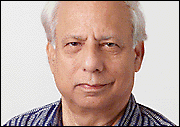

![]()
Other Views


![]()
Other Views
THE year is 1982. The place -- a dingy lane in a run-down section of New Delhi, known as Pahar Ganj. The area is popular with low-budget back-packers from the West and is home to cheap hotels, which most middle-class Indians would avoid. JFK Jr.’s experience in India
An American, in his early 20s, walks with a slow but deliberate step. He looks up now and then to read the sign boards and is thankful that most are in English.
Suddenly, he stops in front of a shabby-looking place. The sign reads Shivalik Lodge.
The visitor hesitates for a second, steps into the hotel and asks for a room. The lodge manager gives his long-haired visitor a cursory look ("Another hippy from the West," he thinks), then pushes a worn-out register for the young man to fill out.
Under the name column, he writes, "John F. Kennedy Jr."
JFK Jr. was 22 years old at the time and an undergraduate at Brown University. He had to write a paper on the functioning of Indian democracy. It was his penchant for adventure and the passion for experiencing life first-hand that had brought him to Shivalik Lodge.
The room John occupied didn't have a telephone or running hot water. That may explain why he went for days without shaving or showering.
JFK Jr. gave himself a daily allowance of about $3.50 and started to travel about Delhi, rubbing shoulders with the crowds.
Every morning, he would set out from his hotel and either hail one of the smoke-belching three-wheel scooters, which provide transportation for most middle-class Indians, or just begin his rounds on foot.
The U.S. Embassy in New Delhi was atwitter, concerned about the well-being of this famous son of America. So Tony Jesudasan, a member of the embassy staff, was assigned to look after JFK Jr.
But John was determined to experience life in India first-hand and on his own. "The only way to know how this democracy functions," he said, "is to live and mingle with the crowds." He asked Jesudasan to leave him alone.
Tony thought of a plan. He called Vishv Bandhu Gupta, an Indian friend who had gone to school in the U.S., and introduced him to John in the hope that Vishv -- an Indian not connected with the embassy -- might be more acceptable to John.
It worked. John took a liking to Vishv and spent a considerable amount of time discussing Indian politics with him.
"I was very impressed by John's grasp of Indian politics," Vishv told me. "He spent many hours in a local library every day reading up on India and then would ask me questions. If no one had told me that he was the famous son of a famous president I would never have known. He was so down-to-earth. Almost self-effacing. He wanted to stay out of the limelight...And (he) was always polite, very polite. He looked upon me as a tutor of sorts and even after we had known each other for weeks, continued to address me as Mr. Gupta."
Vishv said JFK Jr. was fascinated by India. He spent endless hours on the streets of Delhi watching such commonplace scenes as a street cobbler mending shoes or a vendor making jalebis, a pretzel-like sweet made from chick-pea flower and dipped in sugar syrup.
Not many people in Delhi, not even the owners of the lodge where John stayed for two months, knew who he was.
But Indian authorities knew.
Indira Gandhi, then prime minister of India, invited JFK Jr. for breakfast. During his meeting with her, John asked a lot of uncomfortable questions. He quizzed Mrs. Gandhi about her suspending civil liberties by declaring a state of emergency in 1977. He also asked about poverty, corruption and the insurgency in the Indian state of Punjab, which many people believed had erupted because of Mrs. Gandhi's mishandling of the situation.
John met with the president, Giani Zail Singh. According to witnesses, the bearded Zail Singh was a little taken aback when John greeted him with a bear hug.
John wanted to discuss politics. The president did not. Zail Singh's main interest in inviting John was to ask him to convince his mother, Jackie Kennedy, who was expected in India shortly, to stay at the president's house as his guest.
JACKIE had already made her reservations to stay at Hotel Taj Mahal.
Two months passed. It was time for Mrs. Kennedy to arrive in Delhi on a private visit to meet with her old friend, Maharani Gayatri Devi, of Jaipur.
John was concerned that his mother might not approve of the way he was living in India. "Don't tell my mother," he would say to Vishv Bandhu Gupta, "where I stay and what I do. She would be upset."
He was right. When the mother and son met at Hotel Taj, Mrs. Kennedy almost fell over at John's disheveled appearance. She immediately asked him to get a hair cut and a shave, and to put on a new set of clothes. John thought for a moment and then said, "OK, Mom."
Inder Kapur is a Honolulu resident and former correspondent
of the Press Trust of India, the national wire service.